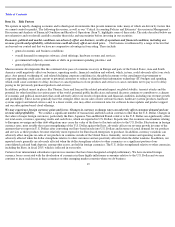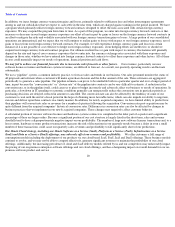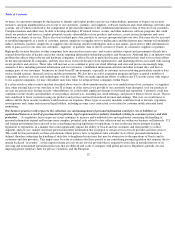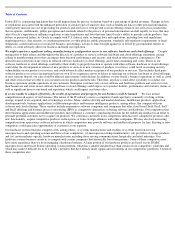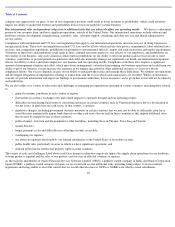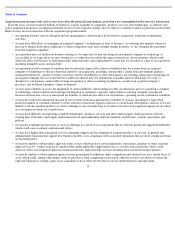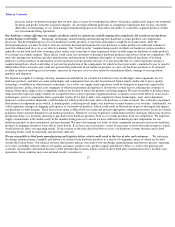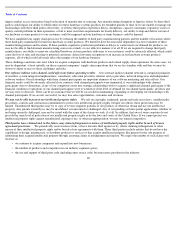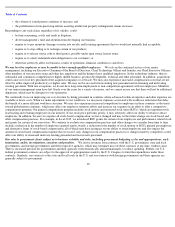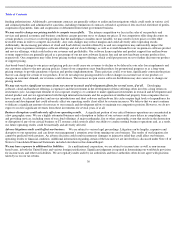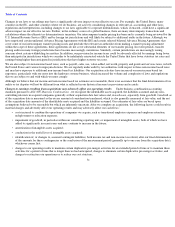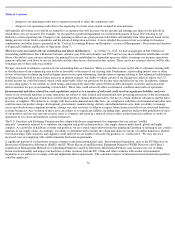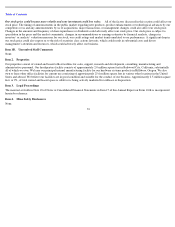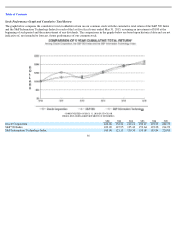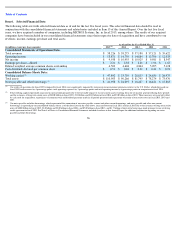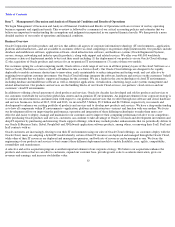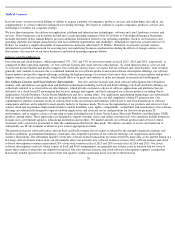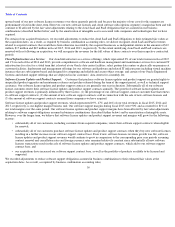Oracle 2014 Annual Report Download - page 33
Download and view the complete annual report
Please find page 33 of the 2014 Oracle annual report below. You can navigate through the pages in the report by either clicking on the pages listed below, or by using the keyword search tool below to find specific information within the annual report.
Table of Contents
Responding to any such claim, regardless of its validity, could:
We may lose key employees or may be unable to hire enough qualified employees. We rely on the continued service of our senior
management, including our Executive Chairman of the Board of Directors, Chief Technology Officer and founder, our Chief Executive Officers,
other members of our executive team and other key employees and the hiring of new qualified employees. In the technology industry, there is
substantial and continuous competition for highly skilled business, product development, technical and other personnel. In addition, acquisitions
could cause us to lose key personnel of the acquired companies or at Oracle. We may also experience increased compensation costs that are not
offset by either improved productivity or higher sales. We may not be successful in recruiting new personnel and in retaining and motivating
existing personnel. With rare exceptions, we do not have long-term employment or non-competition agreements with our employees. Members
of our senior management team have left Oracle over the years for a variety of reasons, and we cannot assure you that there will not be additional
departures, which may be disruptive to our operations.
We continually focus on improving our cost structure by hiring personnel in countries where advanced technical expertise and other expertise are
available at lower costs. When we make adjustments to our workforce, we may incur expenses associated with workforce reductions that delay
the benefit of a more efficient workforce structure. We may also experience increased competition for employees in these countries as the trend
toward globalization continues, which may affect our employee retention efforts and increase our expenses in an effort to offer a competitive
compensation program. Our general compensation program includes stock options and restricted stock units (RSUs), which are important tools
in attracting and retaining employees in our industry. If our stock price performs poorly, it may adversely affect our ability to retain or attract
employees. In addition, because we expense all stock-based compensation, we have changed and may in the future change our stock-based and
other compensation practices. For example, in fiscal 2015, we introduced RSU grants for certain of our employees and performance related stock
unit grants for certain of our executives. We continue to evaluate our compensation practices and other changes we consider from time to time
include a reduction in the number of employees granted equity awards, a reduction in the number of stock options or RSUs granted per employee
and alternative forms of stock-based compensation, all of which may have an impact on our ability to retain employees and also impact the
amount of stock-based compensation expense that we record. Any changes in our compensation practices or changes made by competitors could
affect our ability to retain and motivate existing personnel and recruit new personnel.
Our sales to government clients subject us to business volatility and risks, including government budgeting cycles and appropriations, early
termination, audits, investigations, sanctions and penalties. We derive revenues from contracts with the U.S. government, state and local
governments, and foreign governments and their respective agencies, which may terminate most of these contracts at any time, without cause.
There is increased pressure for governments and their agencies, both domestically and internationally, to reduce spending. Further, our U.S.
federal government contracts are subject to the approval of appropriations made by the U.S. Congress to fund the expenditures under these
contracts. Similarly, our contracts at the state and local levels in the U.S. and our contracts with foreign governments and their agencies are
generally subject to government
29
•
the volume of issued patents continues to increase; and
•
the proliferation of non
-
practicing entities asserting intellectual property infringement claims increases.
•
be time consuming, costly and result in litigation;
•
divert management
’
s time and attention from developing our business;
•
require us to pay monetary damages or enter into royalty and licensing agreements that we would not normally find acceptable;
•
require us to stop selling or to redesign certain of our products;
•
require us to release source code to third parties, possibly under open source license terms;
•
require us to satisfy indemnification obligations to our customers; or
•
otherwise adversely affect our business, results of operations, financial condition or cash flows.


